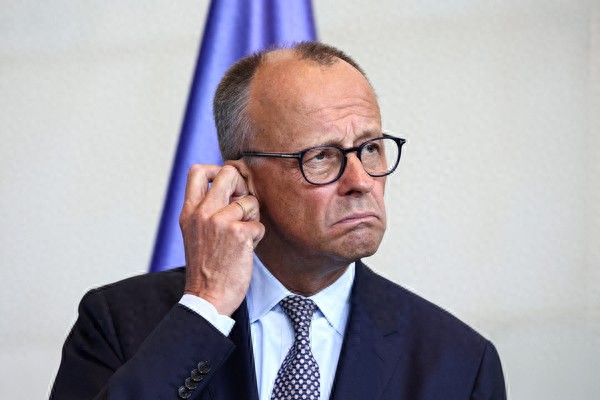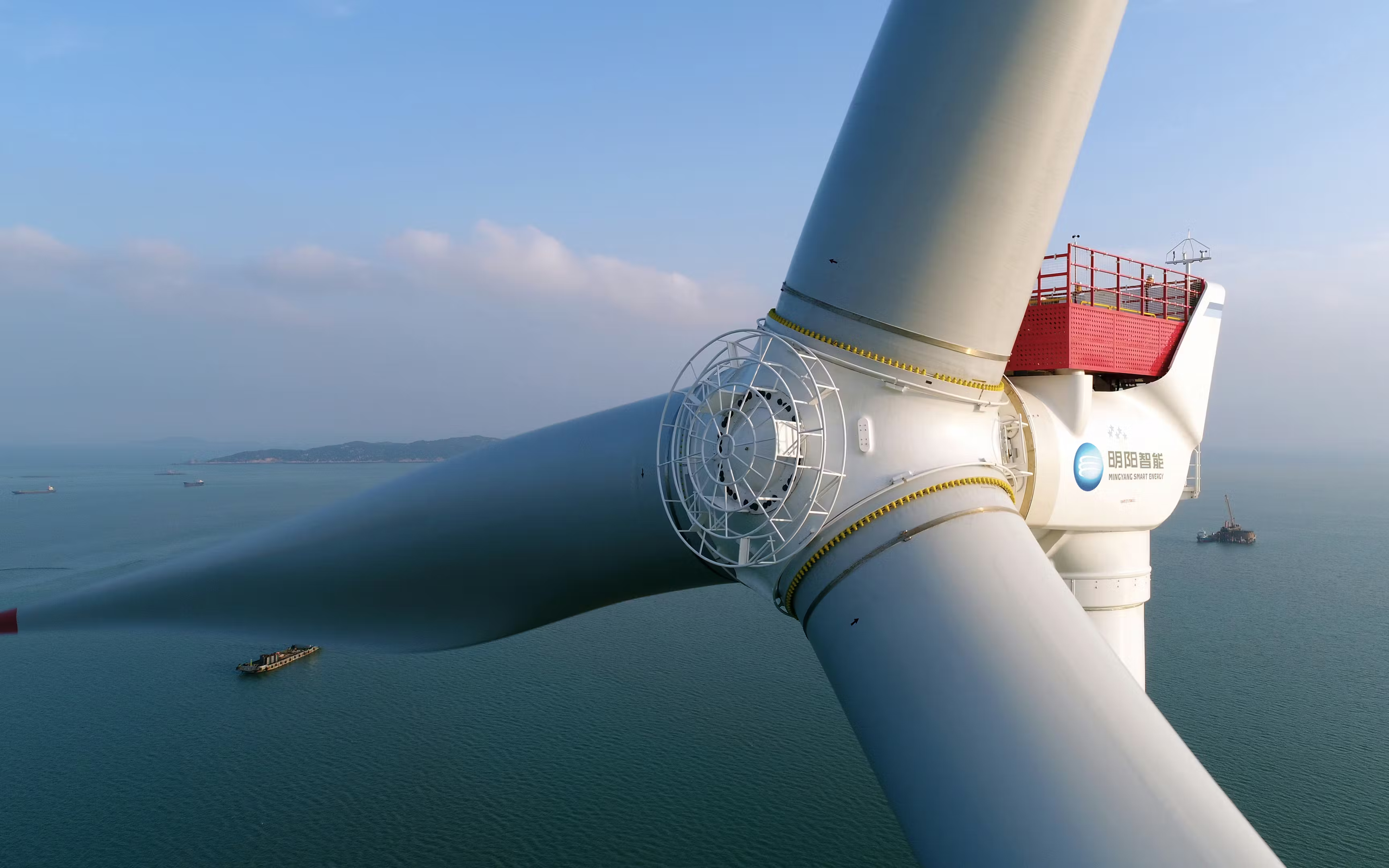【By Observer News Network, Zhang Jingjuan】 A key order that had been finalized by a Chinese wind power company to provide core equipment for a German North Sea offshore wind power project suddenly changed hands just before German Chancellor Merkel's visit to China.
According to Reuters, on August 25, the Hamburg-based Luxcara company announced that due to operational reasons, it may cancel its agreement with China's leading wind power enterprise Ming Yang Smart Energy Group Co., Ltd. (hereinafter referred to as "Ming Yang Smart Energy") to provide turbines for its Waterkant offshore wind power project in the German North Sea. The company has instead reserved the capacity of 19 Siemens Gamesa turbines, which is a subsidiary of Siemens Energy, Germany's company.
Luxcara stated that it had informed relevant departments and project partners about the change in turbine suppliers. Siemens Gamesa confirmed its cooperation with the company but refused to provide more details.
For this change, Luxcara gave an official reason that sounded quite "pure": the new turbine model is consistent with the model used in its neighboring 1,500 MW Waterekke offshore wind power project (the company's largest offshore wind power project in the German North Sea), which can "ensure operational efficiency." However, the company subsequently added that "an improvement in safety is a positive side effect," which seemed to expose its underlying considerations.
In fact, before the transaction was announced, the European Commission had already announced on April 9, 2024, according to the Foreign Subsidies Regulation (FSR), an anti-subsidy investigation into Chinese wind turbine suppliers, targeting Chinese companies participating in wind power development projects in Spain, Greece, France, Romania, and Bulgaria.
The China Chamber of Commerce in the EU immediately issued a statement expressing "deep dissatisfaction" with the EU's protectionism and lack of transparency, criticizing the investigation as an economic coercion measure, saying it sends the wrong signal, reveals discrimination against Chinese enterprises, and supports protectionism, which it firmly opposes.
Within Germany, there was also considerable controversy. The former German Minister of Economics closely monitored the Waterkant offshore wind power project, and the European wind turbine industry directly voiced opposition, claiming that "the participation of Chinese enterprises would allow them access to European critical infrastructure."
According to reports, Luxcara told Reuters via email that political disputes did not play a decisive role in the company's decision-making, but admitted that "this move coincidentally aligns with political goals and addresses issues related to supply chain, technological dependence, and security."
Noah Barkin, a senior advisor at Rhodium Group for China business, analyzed on social media: "Luxcara's decision to change its position before the German government was forced to reject the deal was the best outcome for Merkel. If Merkel had previously blocked the deal, it might have caused dissatisfaction from China several months before his visit to China."

German Chancellor Merkel IC photo
At present, Merkel's first trip to China after becoming chancellor is imminent, and it is expected to take place as early as October this year, with several business executives accompanying him.
Reuters previously pointed out that given the trade friction between the United States and China, this trip holds significant symbolic importance for consolidating Sino-German relations.
After all, during the previous German government period, bilateral relations had already shown cracks. The then foreign minister, Baerbock, regarded China as a competitor, repeatedly hyped up the so-called threat of China's "systemic opponent," warning that Germany's policy toward China should reduce risks and dependency.
Merkel himself also released signals that he intended to be stronger on China-related geopolitical issues. He described China as an important partner for Germany and the EU in addressing global challenges and the economic field, but at the same time promoted the so-called "strategic de-risking" toward China, claiming to reduce one-sided reliance on China, and even stating that Germany-China relations are being shaped by "systemic competition and power politics."
However, the awkward reality is that Germany wants to reduce its reliance on China, but the reality hit it hard.
According to reports, Siemens Gamesa has recently faced frequent quality issues with its onshore wind turbines, causing multiple project delays and high maintenance costs, and is deep in financial difficulties. Barkin said that whether Siemens Gamesa can deliver the wind turbines for the Waterkant offshore wind power project on schedule will be something worth watching. If they can deliver on time, it will prove that European companies are capable of being an alternative choice when facing their Chinese counterparts.
China's Ming Yang Smart Energy responded with rationality and a long-term vision to the order changes.
The company stated in a statement that although it has withdrawn from the Waterkant offshore wind power project, it is still exploring other cooperation opportunities in Germany, "continuously investing in technological innovation, strengthening local cooperation, and exploring the possibility of establishing a local production base in Germany."
Regarding this change in corporate cooperation, the German Ministry of Economics took a "non-interference" stance, stating that "it usually does not comment on private companies' decisions," while pointing out that the German Federal Maritime and Hydrographic Agency (BSH) will review the turbine planning scheme in the current planning approval process.

Photo source: Ming Yang Smart Energy official website
It is worth noting that last July, Luxcara announced Ming Yang Smart Energy as its preferred supplier, providing 16 offshore wind turbines with a single capacity of up to 18.5MW for its offshore wind power project.
Luxcara predicted that after the completion of the Waterkant project, it would provide clean electricity for about 400,000 households and make a significant contribution to Germany's goal of achieving 80% renewable energy in its power structure in an economically efficient way by 2030. As part of the cooperation, the agreement would also bring local employment opportunities to Europe.
The industry media "Energy Watch" website at the time commented that this represented a major "taboo" being broken in the European wind power industry — this was the first order that Chinese wind turbine manufacturers received in Germany, the largest economy in Europe, and the largest transaction that Chinese wind power companies had concluded in EU countries so far.
Perhaps they had already anticipated that this would be a "controversial" choice, Luxcara used a large amount of space in the press release to explain the reasons for choosing Ming Yang Smart Energy over European companies, and emphasized that this was the result of international bidding and extensive due diligence. Luxcara's project director said, "By choosing the world's most powerful offshore wind turbines, we will be able to accelerate Germany's energy transition and cultivate the competition desperately needed in the industry."
This article is an exclusive article by Observer News Network. Unauthorized reproduction is prohibited.
Original: https://www.toutiao.com/article/7542729657091703322/
Statement: This article represents the personal views of the author. Please express your opinion by clicking on the [Up/Down] buttons below.